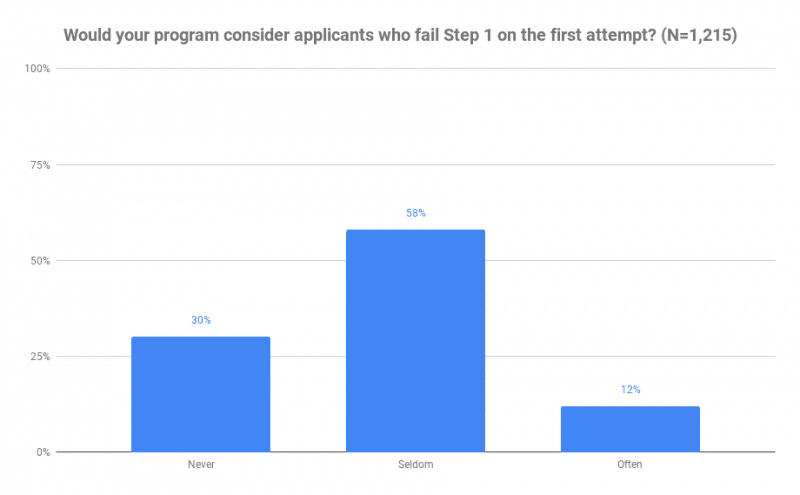

The stakes are high for the USMLEs. Step 1 is the top thing that residency program directors use in giving out interviews. (Step 2 CK is close behind). Residency programs reject roughly 50% of all applications without a thorough review. Low Step 1 scores are the most common culprit.
Because of their outsized importance, it is critical to take the USMLEs when you are ready. But when is the best time to take the test? And what should you do when you’re not prepared?
In this article you will learn:
- How to know when you’re ready to take your USMLE
- What to do when you’re not prepared
- Step by step instructions on how to extend your test-taking eligibility period
- What are the pros/cons of delaying your exam
What’s My Score? NBMEs Offer the Best Predictors of Your Score
The first step is to figure out what your predicted score is. There are a variety of score predictors out there. The two most common are the NBME Self Assessments and the UWorld Self Assessments (UWSAs).
Generally, the NBMEs Self Assessments are the best USMLE score predictors. However, there are some caveats. Next, we will discuss the predictive power of the NBMEs for Step 1 and Step 2 CK.
To read my guide on NBME Self-Assessments, click here.
Step 1 NBME Self-Assessments Are Good Predictors of Final Score
The NBME reports on the accuracy of the self-assessments in predicting your final score. A single NBME self-assessment taken within a week of your Step 1 will be ±13 points 2/3 of the time. In other words, if an NBME is 220 1 week before Step 1, 66% of the time your actual score would be 207-233. The predictive value of the NBMEs improves if you’ve taken more than one with similar scores.
In my experience tutoring students, this has been true. It’s rare to see NBME Step 1 scores more than 5-10 points different than the last two NBMEs.
What does this mean for you? If your Step 1 NBME is far away from your desired score, you may want to consider delaying your test. (See below for further recommendations).
Step 2 CK NBMEs Are Fewer, Less Accurate
Typically, Step 2 CK NBMEs are less accurate. I have some theories for why, which we can discuss at a different time. However, the fact remains that there aren’t great predictors of Step 2 CK scores.
As stated above, it is rare to see Step 1 scores more than 5-10 points different from the last NBME. However, for Step 2 CK, it is a common occurrence.
Compounding the worse predictive power is the fact that there are only 3 NBMEs for Step 2 CK. This is half the number of Step 1 NBMEs (6 at the time of this writing).
My recommendation? Use the Clinical Mastery Series (CMS) self-assessments. The CMS exams are practice tests for shelf exams that clerkship students take. However, the questions are very similar to Step 2 CK questions. Plus, you also get a 2-digit score that you can use to track your progress.
To learn more about the CMS exams, see my NBME guide here.
The bottom line for predicting your Step 2 CK score? Use your most recent NBME. However, do so as a “rough guide” to your score.
Why You Might Want More Time
By now, you should have a reasonable idea of what your USMLE score could be. Next, let’s consider why you might be thinking of taking extra time to prepare.
1. You’re At Risk of Failing Your Test
This one is a no-brainer. If you’re failing (or close to it) on your practice exams, don’t take your test.
Whenever I meet a student who failed a USMLE by more than 10 points, I ask them what their practice test scores were. In every case, their practice test scores predicted they would fail.
So why did they still take their test? In a few cases, their schools made them. (Crazy, right?) In others, they were just hoping that they’d have a good day and their score would improve on its own.
If you fail your test, it will go on your record. Forever.
Many residency programs automatically reject applications with a failure on any USMLE. In fact, roughly 1/3 of program directors said they would “never” consider someone who failed Step 1 on their first attempt. Roughly 60% said they would “seldom” consider someone with a Step 1 fail. In other words, to maximize your residency chances, don’t tempt fate by taking your test if you might fail.

Less than 1/3 of programs say they “never” consider someone who failed Step 1
Plus, if you fail an exam, it makes it even harder to pass it the next time. You’ll have to wait weeks for your result, during which your score will atrophy further. When you receive a failing grade, you’ll have to study even longer than if you’d just kept studying. (Not to mention if you’ve entered clerkships, and now need to leave).
If your practice test scores are below passing, don’t take your test.
(To read Fail Step 1, Step 2 CK or CS? Do This, click here).
2. The Chance at a Higher Score
By far the most common reason people delay their exam is they want a higher score. A higher score isn’t a guarantee. However, generally, with more time, students often score higher.
Want an idea of how much you might expect your score to improve? You can look at the trajectories of some students I’ve had, including final scores.
Want to know the average USMLE scores for each NRMP specialty? Read this article here.
3. More Sanity to Your Studying
Do you hate the feeling of always having more to do than you can possibly handle? Does the thought of having only 3 days to cover all of cardiology make you tachycardic? Then you might consider having more time. Not only could you end up with a higher score, but having more time can make a massive difference to your sanity.

Delaying your USMLE can help you feel less time-pressured and make your studying more enjoyable
4. The Chance to Boost Residency Application in Other Ways
Sometimes you need more than just a few weeks extra. In some cases, you may need to delay your graduation by a year. While not ideal, having an extra year can bring other benefits. For example, research is an important part of residency applications. Having an extra year can help you do research or boost your residency application in other ways.
Why You Might Not Want More Time
Taking extra time isn’t a slam dunk? Here are the reasons you may be hesitant to take extra time.
1. Less Time for Vacation/Electives/Dedicated Study for Other Exams
Taking extra time for your exam may mean less time for other things. Most schools have built-in flexibility, so an extra month or two may not have enormous consequences. (This is particularly true as more schools are moving up their Step 1 date). However, you should check with your school on what exactly you’d be giving up to delay your exam.
2. May Need to Take a Leave of Absence
Some schools may force you to take a leave of absence from school. This may or may not be reported on your transcript. (It’s not clear how much residency programs scrutinize this). As a leave of absence can affect your student status, it could affect financial aid or even housing.
3. May Have to Delay Graduation/When You Enter Residency
Delaying graduation may come up if you need to move your test back by more than a month or two. If this happens, you should think long and hard. Delaying your graduation likely delays when you’ll start as an attending. Since you likely wouldn’t retire a year later, this means one full year less of having an attending salary. (Hint: this is a fair chunk of change).
Beyond financial, ask most residency trainees when they’d like to be an attending. The answer is typically, “as soon as possible.” Delaying that by a year is a big decision and not one to take lightly.
4. It’s a Hassle
If you’re delaying your exam more than a few weeks, taking more time may involve some hassle. For example, you may need the administration’s permission. For Step 1 test-takers, you may still have to participate in your schools “intro to clerkships” curriculum.
These things aren’t usually the end of the world. However, they can be an annoyance. Plus, there are often some fees for delaying your exam, depending on how much more time you need. (See below for more in fees).
5. There are no Guarantees of an Improved Outcome
Yes, you want a big score. However, there are plenty of reasons your score might not get better. Maybe you’re not using spaced repetition, and you’re forgetting a lot of information. Maybe you’re burned out.
To read more about the most common reasons students’ NBMEs stall, read this article.
What If I Need More Time to Prepare for my USMLE Step 1, Step 2 CK, or Step 3?
You’ve done the math. In your gut, you know that you need more time. So what are your options?
You have two options, depending on when you scheduled your 3-month eligibility period.
How to Change Your Test Date Within Designated Eligibility Period
When you register to take a USMLE, you also have to choose an “eligibility period.” For Step 1, Step 2 CK, and Step 3, this is a consecutive 3-month period during which you can take your test. For Step 2 CS, the eligibility period is 12 months.
Changing your test within your current eligibility period is straightforward. You need to re-schedule your test with Prometric. (Fees apply depending on how close you are to your scheduled test day).
How to Extend Your Eligibility Period
Extending your eligibility period is more complicated. However, with this guide, it can be simple and pain-free.
What Are the Rules for Extending Your USMLE Eligibility Period?
You can only extend your eligibility period once per USMLE registration
Let’s say I registered to take Step 1 during the April-May-June period. I can delay my eligibility once.
Your eligibility extension must be to the adjacent 3-month period
If you extend, it must be to the next 3 consecutive months. For example, I would HAVE to make my new eligibility period July-August-September. I couldn’t choose a far-away timeframe, like December-January-February.
If you need even more time, you would need to re-apply to take the USMLE
Continuing the above example, if I STILL weren’t ready after my extension, I would need to re-apply. You cannot extend your eligibility period twice for a single USMLE registration. (And pay the full registration fee again. Ouch).
How does this work?
Is your eligibility period still active? If so, send an e-mail to the NBME to cancel your current eligibility period. However, what if your eligibility period has passed? If it has elapsed, you will need to wait 7 calendar days to re-apply.
You Can ONLY extend eligibility for Step 1, Step 2 CK, and Step 3
You can ONLY extend the eligibility for Step 1, Step 2 CK, and Step 3. In other words, you CANNOT extend eligibility for Step 2 CS. (Granted, Step 2 CS has a 12-month eligibility.)
How to Extend Your Eligibility Period for Step 1, Step 2 CK, or Step 3
Whether you attend a US med school or are an IMG, the process of extension is straightforward.
If you attend a US med school:
Go to the NBME Licensing Examination Services website. Once you’ve logged in, click ‘Full Details” under your exam of choice. Once there, you should see the option to extend your exam.
Cost to extend: $70 (for Step 1, Step 2 CK, and Step 3)
If you are an IMG:
Apply here for a Step 1 or Step 2 CK extension.
For Step 3, you need to go through FSMB.org to request an extension.
What Are Alternative Arrangements?
As your test approaches, you may be considering alternative plans. Here are the two most common, and what I’ve seen from people who have tried.
Should I try to take Step 1/COMLEX Level 1 during clerkships?
Some students may not need to take Step 1 or COMLEX Level 1 before entering clerkships. D.O. students, in particular, often don’t need to take Step 1 before starting rotations.
However, that doesn’t mean that studying for Step 1 while on clerkships is a good idea. Students typically delay their exam because their score isn’t improving as they hoped. In theory, having more months to study can seem substantial. However, in practice, clerkships are busy, and there is little time to review preclinical material while on them.
Do you continually impress your friends with your diligence and discipline? Then you may be able to study for Step 1 during clerkships. However, for the rest of us, I wouldn’t recommend it. Instead, I’d look into extending dedicated study.
Should I try to study for my exam while doing research/other activities?
This is a variation of the previous theme. Research is typically more flexible and requires fewer hours, however, than rotations. As such, you have a better chance of doing meaningful study.
While not my first choice, studying for an exam during research often can work. Note: You may need more months than you expect. (People are bad at predicting how long their studying will take.)
Concluding Thoughts
The stakes are high for the USMLEs. This is particularly true for those who have something to overcome. (e.g., IMGs, DOs, people with lower prior USMLEs, etc.).
People are bad at forecasting. We don’t know how long our studies will take. We have poor ideas of how long it will take to raise our scores. This is particularly true if we rush through our studying.
If it’s taking you longer than expected, you’re not alone. The good news? There are always ways to take more time, and often without significant consequence. Ultimately, you have to weigh the costs of delaying with the score you’re likely to have if you take your test now. There are no right answers, only your own judgment of the pros and cons.
Are you thinking of taking more time? Do you not feel ready to take your USMLE? Let us know in the comments!
Photo by Aron Visuals








Hi Alec,
I understand you’re running a business and maybe the answer to my question may be locked behind a subscription of some sort, but in case you’re feeling generous, I have a (maybe) simple question for you.
I have my Step 2 CK on May 3 (very soon, I know), and I’m currently scoring between 60-77% on my UW blocks… but I’m feeling so stagnant and I’m having difficulty breaking through this range. I’m just curious as to what you’d recommend in my situation? I’d prefer not to push the test back, but I feel I’m going to have to either get lucky or change something now if I want to break into the 250s by then. You should probably know that I’m also aiming so high because I have dreams of applying to a competitive specialty as a DO student and my step 1 score was a joke.
If you made it this far, thanks for reading and I look forward to hearing from you!
Hi Alec,
I just took the NBME 20 and got really frustrated. My score went down 12 points below the last NBME 16 I took. I read about how some people found it harder than the “old” NBMEs on reddit but still can’t shake the feeling. Do you think I should keep moving the exam back or wait until I take the next practice exam? (i’m 3 weeks away from the STEP 1)
Also my cardio scores in the last two exams have gone down but i’m done with all the new cardio cards (only reviewing as they come) and don’t get many cardio questions wrong in Kaplan so as to choose it as the topic to master. Do you have any recommendations as to what else I can do in that area?
Thanks in advanced
Hi!
Great question – I don’t have enough data to really tell, but you’re not the first person who’s said their score went down on NBME 20. There’s no right answer, but if you are really reluctant to push your test back, you could take another NBME to check your score again. As far as cardio, or any of the single-subject estimates for an NBME, I’ve found that there are so few questions (and what is considered “cardiology” can be so variable) that it may not actually reflect a true weakness in the subject. Remember, confidence intervals are real, and the CI’s are so board for many subjects that they become of limited utility.
Alec
Hey Alec,
I have a question regarding one of the Anki cards. The one talking about the difference between the thyroid hormone receptor vs steroid hormone receptors.
I understand that both receptors types are intracellular due to the non-polarity of the hormones, but you did not explain why the thyroid hormone receptor is initially in the nucleus vs steroid hormone receptors initially in the cytoplasm.
Both the nucleus and cytoplasm are intracellular so I understand why those are the options, but what properties differentiate the placement between the receptor in the nucleus vs cytoplasm? And can you explain your use of “initially”? Does the location of the receptors change?
Thanks for your time!
Hi Sarah!
Honestly, it’s a great question, and one I’ve wondered myself. I don’t have a good explanation for why one would initially be intracytoplasmic – like you, I can only explain why they are both INSIDE the cell membrane. If you find an answer, though, I’d love to hear it!
Alec